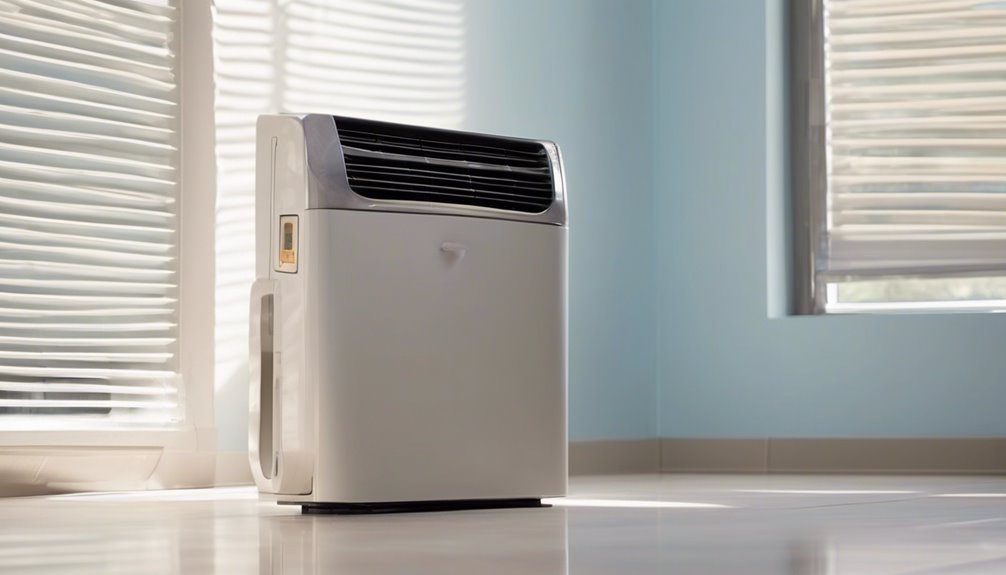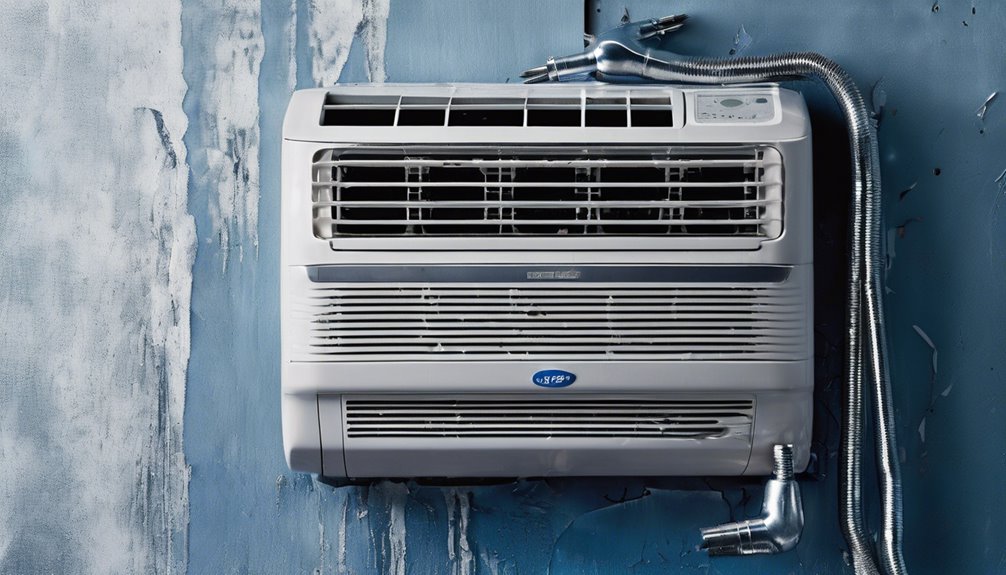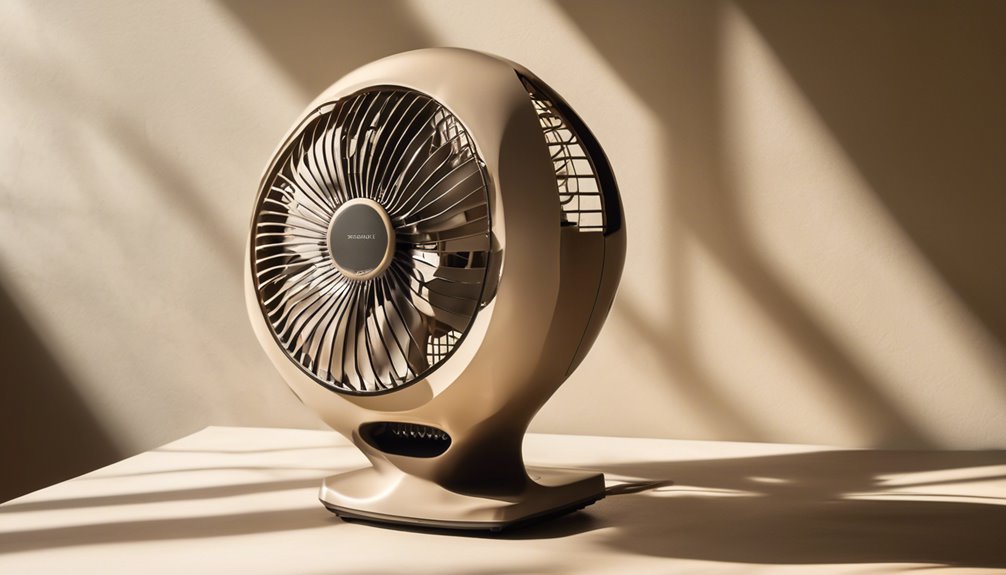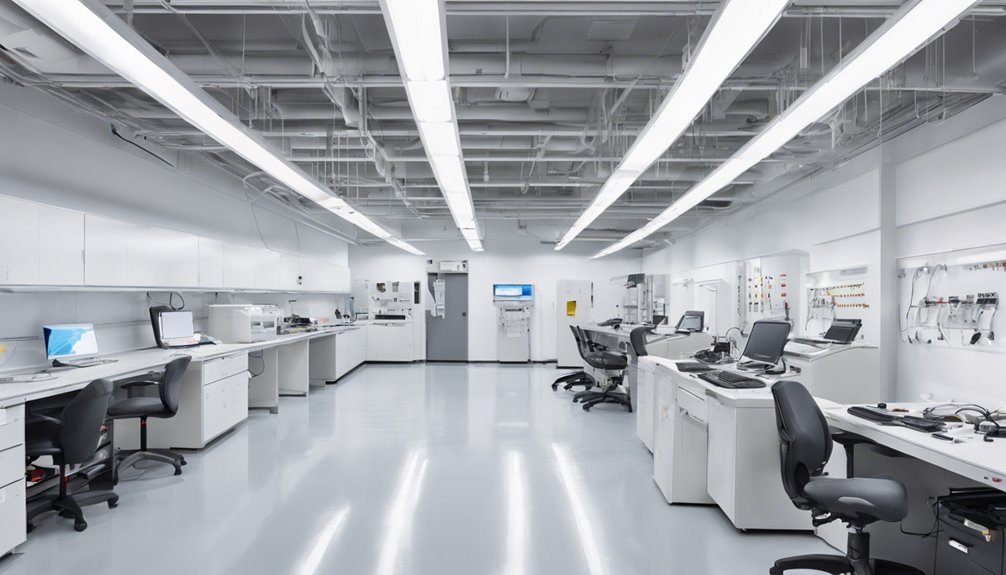You're wondering how much electricity your 1.5 ton AC uses? Well, the answer varies depending on the model, usage patterns, and environmental conditions. On average, it consumes around 1.2-1.5 kilowatts of power, translating to approximately 10-12 units of electricity per day, assuming 8 hours of daily usage. But that's just the tip of the iceberg – understanding the factors that affect your AC's energy consumption can help you optimize its performance and reduce your energy bills. Want to learn more about how to do just that?
Key Takeaways
- The average power consumption of a 1.5 ton AC varies depending on the model, usage patterns, and environmental conditions.
- Check the AC's manual or manufacturer's website for power consumption in watts to determine daily energy consumption.
- Use an Energy Calculator to calculate daily energy consumption by entering wattage, number of hours used daily, and cost of electricity in the area.
- Factors like ambient temperature, humidity levels, cooling capacity, air flow, and room size affect electricity usage and daily energy consumption.
- Regular maintenance, such as cleaning filters and coils, and adjusting the thermostat, can help reduce electricity consumption and optimize energy efficiency.
Understanding AC Tonnage and Its Impact on Energy Consumption
One crucial factor in determining how much electricity your air conditioner uses is its tonnage. Essentially, the tonnage of your AC refers to its cooling capacity.
A higher tonnage means your AC can cool a larger space, but it also consumes more power. When it comes to AC components, the compressor, fan, and thermostat are the primary energy consumers.
Higher tonnage ACs cool larger spaces, but also guzzle more power, with compressors, fans, and thermostats being the biggest energy hogs.
Regular AC maintenance is vital to ensure these components work efficiently. By cleaning the air filters, coils, and fans, you can reduce energy consumption and prolong the lifespan of your AC.
Additionally, proper maintenance helps prevent overheating, which can lead to increased energy bills. By understanding your AC's tonnage and maintaining it regularly, you can optimize its energy consumption and save on your electricity bills.
The Average Power Consumption of a 1.5 Ton AC
When you're trying to determine how much electricity your 1.5 ton AC uses, you need to consider its power consumption pattern, which varies depending on the cooling capacity and energy efficiency rating.
You'll find that the AC's power consumption is highest when it's first turned on and gradually decreases as the room cools down. By understanding these factors, you can get a better sense of your AC's average power consumption.
Power Consumption Pattern
The average power consumption of a 1.5 ton AC varies depending on several factors, including the model, usage patterns, and environmental conditions.
You'll notice that your AC's power consumption pattern changes throughout the day. When you first turn it on, it consumes more power to cool the room quickly.
Once the desired temperature is reached, the AC's power consumption decreases. This fluctuation is reflected in your energy meter readings.
The power grid supplies electricity to your AC, and the meter measures how much you're using. Understanding this pattern helps you anticipate your energy bills and make informed decisions about your AC usage.
Cooling Capacity Impact
How does the cooling capacity of your 1.5 ton AC impact its power consumption?
This is a crucial aspect to understand, as it's often shrouded in cooling myths. Let's separate fact from fiction.
- Higher capacity, higher consumption: A 1.5 ton AC consumes more power than a smaller capacity AC, even when running at the same temperature.
- Cooling speed matters: Faster cooling means higher power consumption, but it also means your AC will reach the set temperature quicker.
- Cooling capacity affects running time: A 1.5 ton AC with a higher cooling capacity will run for shorter periods, consuming less power overall, compared to a smaller capacity AC that runs for longer periods.
Energy Efficiency Rating
You're likely wondering what the average power consumption of a 1.5 ton AC is, and that's where the energy efficiency rating comes in.
This rating is usually displayed on energy labels, providing you with valuable information about the AC's power consumption.
In India, the Bureau of Energy Efficiency (BEE) has a rating system that awards stars to ACs based on their energy efficiency.
A 5-star rating indicates the highest energy efficiency, while a 1-star rating indicates the lowest.
When shopping for a 1.5 ton AC, look for the energy label and opt for a higher-rated model to save on your electricity bill.
A higher rating translates to lower power consumption and reduced energy costs over time.
Factors Affecting the Electricity Usage of Your AC
When you're trying to gauge your AC's electricity usage, you need to consider several factors that impact its performance.
You'll want to think about the ambient temperature ranges your AC operates in, as well as the humidity level in your space, since both can significantly affect your unit's energy consumption.
Additionally, you'll need to consider your AC's cooling capacity and how it influences its electricity usage.
Ambient Temperature Ranges
The ambient temperature range in which your 1.5-ton AC operates significantly impacts its electricity usage.
As you're probably aware, temperature fluctuations can greatly affect how hard your AC has to work. The outdoor conditions in your area play a huge role in this.
For instance:
- Hotter climates: If you live in a region with extremely high temperatures, your AC will consume more electricity to cool your space.
- Mild temperatures: In areas with moderate temperatures, your AC's electricity usage will be relatively lower.
- Cold climates: If you live in a region with cold winters, your AC's electricity usage will be minimal or even zero during those months.
Keep in mind that these temperature ranges will directly influence your AC's electricity consumption, so it's essential to consider them when calculating your energy costs.
Humidity Level Effects
Humidity levels in your area also play a significant role in how much electricity your 1.5-ton AC uses. You might not know that high humidity can increase your AC's energy consumption. This is because your AC has to work harder to remove excess moisture from the air, which uses more electricity. Many modern ACs come equipped with humidity sensors that can detect when the air is too humid. They can then switch to dehumidifying modes to remove excess moisture, which can help reduce energy consumption.
| Humidity Level | AC Mode | Electricity Usage |
|---|---|---|
| Low (30-40%) | Cooling | Normal |
| Medium (40-60%) | Dehumidifying | Slightly Higher |
| High (60-80%) | Dehumidifying | Higher |
| Very High (80-90%) | Dehumidifying | Highest |
| Extremely High (above 90%) | Dehumidifying | Extremely High |
Cooling Capacity Impact
About 90% of your 1.5-ton AC's electricity usage depends on its cooling capacity.
This means that the amount of heat your AC can remove from the air has a significant impact on how much electricity it consumes. When you set your AC to a lower temperature, it has to work harder to cool the air, which increases its electricity usage.
- Cooling demands: If you live in a hot and humid climate, your AC has to work harder to cool the air, resulting in higher electricity usage.
- Air flow: If the air flow in your room is restricted, your AC has to work harder to cool the air, increasing its electricity usage.
- Room size: If your room is larger, your AC has to cool more air, resulting in higher electricity usage.
Calculating the Daily Energy Consumption of Your 1.5 Ton AC
You're probably wondering how much electricity your 1.5 ton AC is guzzling daily.
To calculate the daily energy consumption, you'll need to know the unit's power consumption in watts. Check your Air Conditioner's manual or the manufacturer's website for this information.
Check your Air Conditioner's manual or manufacturer's website for the unit's power consumption in watts.
Once you have the wattage, you can use an Energy Calculator to determine the daily energy consumption. Simply enter the wattage, the number of hours you use the AC daily, and the cost of electricity in your area.
The calculator will give you an estimate of your daily energy consumption in kilowatt-hours (kWh) and the corresponding cost. This will help you plan your energy budget and make informed decisions about your AC usage.
The Role of Star Ratings in Determining Energy Efficiency
Now that you've got a handle on calculating your daily energy consumption, it's time to explore how to optimize it.
One way to do this is by looking at the star ratings on your AC's Energy Labels. These ratings indicate the appliance's energy efficiency, with more stars meaning less energy consumption.
Here are three key benefits of choosing an AC with high star ratings:
- Lower Electricity Bills: By consuming less energy, you'll see a significant reduction in your electricity bills.
- Environmental Benefits: Using less energy means reducing your carbon footprint and contributing less to climate change.
- Increased Durability: Energy-efficient ACs often have a longer lifespan, reducing the need for frequent replacements.
Tips to Reduce the Electricity Consumption of Your 1.5 Ton AC
Your 1.5 ton AC is a significant contributor to your electricity bill, but with a few tweaks, you can reduce its energy consumption and save money.
Start by adjusting the thermostat to optimize cooling while minimizing energy usage. You can also take advantage of smart features like scheduling and zoning to customize your cooling experience.
Consider investing in energy audits to identify areas of inefficiency in your home and optimize your AC's performance. Additionally, ensure your AC is properly maintained by cleaning the filters and coils regularly.
Comparing the Energy Efficiency of Different AC Brands
Different AC brands boast varying levels of energy efficiency, and understanding these differences is crucial in making an informed purchase decision.
You'll want to research and compare the energy efficiency of different brands before making a purchase.
- Energy Star rating: Look for ACs with high Energy Star ratings, which indicate energy efficiency.
- Model variations: Check if the brand offers model variations with different energy efficiency features.
- Inverter technology: Some brands offer inverter technology, which can significantly reduce energy consumption.
Making the Most of Your 1.5 Ton AC While Saving Energy
How can you maximize the performance of your 1.5 ton AC while keeping energy consumption in check? By leveraging smart features and adopting seasonal usage habits, you can enjoy a comfortable indoor climate while saving energy.
| Smart Feature | Benefit | Seasonal Usage Tip |
|---|---|---|
| Inverter Technology | Optimizes compressor speed | Adjust temperature by 1°C in winter and summer |
| Auto-Restart | Resumes operation after power outage | Schedule restarts during off-peak hours |
| Dehumidifying Mode | Reduces humidity | Use during monsoon seasons |
| Energy-Saving Mode | Limits power consumption | Activate during peak summer months |
| Remote Access | Controls AC from anywhere | Monitor and adjust settings remotely |
Frequently Asked Questions
Can I Use a 1.5 Ton AC With a 1 Kv Inverter?
You can't use a 1.5 ton AC with a 1 kVA inverter as it's underpowered; the AC requires a higher inverter capacity for seamless operation and power backup, so consider upgrading to a 2-3 kVA inverter for optimal performance.
How Does Humidity Affect My Ac's Electricity Consumption?
You'll notice your AC consumes more power in a humid climate, as it works harder to remove excess moisture from the air. In moist air, your AC's compressor and fan have to run longer, increasing electricity consumption.
Can I Run My 1.5 Ton AC on Solar Power?
You're wondering if you can run your 1.5 ton AC on solar power. Yes, you can! You'll need sufficient solar panels to generate enough energy and an energy storage system to store excess power for later use.
Are 1.5 Ton ACS Suitable for Small Server Rooms?
You're wondering if a 1.5 ton AC is suitable for your small server room. It depends on your server layout and air circulation. If you have a compact setup with good airflow, a 1.5 ton AC might be enough to keep your equipment cool.
Do ACS Consume More Power During the Night?
You might wonder if your AC consumes more power at night, and the answer is no. In night mode, most modern ACs adjust their settings to conserve energy, aligning with your sleep schedule to minimize power consumption.
Conclusion
You've made it to the end of this article, and now you're well-equipped to manage your 1.5 ton AC's electricity consumption. Remember to check the star rating, adjust the thermostat, and maintain your AC regularly to reduce energy usage. By doing so, you'll not only save on your electricity bill but also contribute to a more sustainable future. With these tips and a better understanding of your AC's power consumption, you can stay cool while keeping your energy costs in check.



